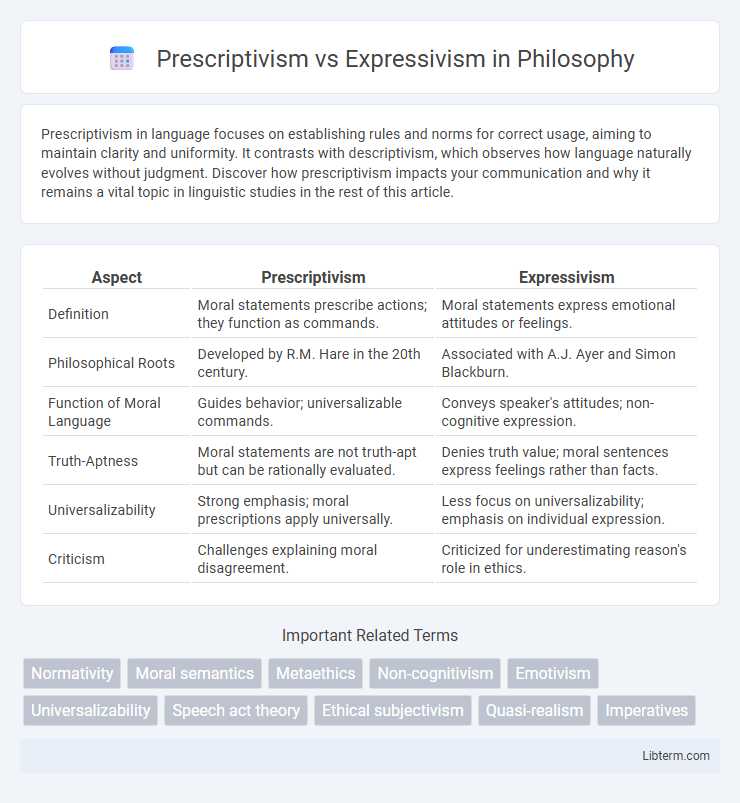Prescriptivism in language focuses on establishing rules and norms for correct usage, aiming to maintain clarity and uniformity. It contrasts with descriptivism, which observes how language naturally evolves without judgment. Discover how prescriptivism impacts your communication and why it remains a vital topic in linguistic studies in the rest of this article.
Table of Comparison
| Aspect | Prescriptivism | Expressivism |
|---|---|---|
| Definition | Moral statements prescribe actions; they function as commands. | Moral statements express emotional attitudes or feelings. |
| Philosophical Roots | Developed by R.M. Hare in the 20th century. | Associated with A.J. Ayer and Simon Blackburn. |
| Function of Moral Language | Guides behavior; universalizable commands. | Conveys speaker's attitudes; non-cognitive expression. |
| Truth-Aptness | Moral statements are not truth-apt but can be rationally evaluated. | Denies truth value; moral sentences express feelings rather than facts. |
| Universalizability | Strong emphasis; moral prescriptions apply universally. | Less focus on universalizability; emphasis on individual expression. |
| Criticism | Challenges explaining moral disagreement. | Criticized for underestimating reason's role in ethics. |
Introduction to Moral Language Theories
Prescriptivism views moral language primarily as a system of prescriptions or commands guiding behavior, emphasizing the imperative function of moral statements. Expressivism interprets moral language as expressions of emotional attitudes or attitudes rather than factual claims, highlighting its role in conveying feelings. Both theories challenge the traditional descriptive view of morality, offering distinct accounts of how moral discourse functions in human communication.
What is Prescriptivism?
Prescriptivism is a philosophical stance in meta-ethics asserting that moral statements function primarily as prescriptions or commands rather than mere expressions of emotions or factual descriptions. It holds that ethical language is used to guide behavior and impose obligations, rather than to state objective truths. This view contrasts with expressivism by emphasizing the normative, action-guiding role of moral discourse.
Key Features of Prescriptivism
Prescriptivism in ethics emphasizes universal moral rules that prescribe how individuals ought to behave, asserting objectivity and consistency in moral judgments. It treats ethical statements as commands or imperatives, guiding actions rather than merely expressing feelings or attitudes. Key features include normativity, universalizability, and the intention to influence behavior through clear moral directives.
What is Expressivism?
Expressivism is a metaethical theory asserting that moral statements primarily express the speaker's attitudes, emotions, or prescriptions rather than describing objective facts. This view contrasts with prescriptivism by emphasizing the expressive function of language in conveying individual or collective commitments. Key figures like Simon Blackburn and Allan Gibbard argue that moral discourse shapes social norms through shared emotional responses and public expressions of approval or disapproval.
Core Principles of Expressivism
Expressivism centers on the idea that moral language primarily expresses emotional attitudes or commitments rather than stating facts. Core principles include the non-cognitivist view that ethical sentences do not describe the world but convey the speaker's approval or disapproval, emphasizing the role of subjective attitudes in moral discourse. Expressivism contrasts with prescriptivism by focusing more on the expressive function of language and the motivational aspect behind moral utterances.
Major Differences Between Prescriptivism and Expressivism
Prescriptivism in ethics asserts moral statements as universal prescriptions guiding actions, emphasizing objective rules and norms, while Expressivism views moral language as an expression of individual attitudes or emotions without truth-apt claims. The major difference lies in prescriptivism's commitment to rational consistency and universality versus expressivism's focus on subjective emotional expression and anti-realist stance on moral facts. Prescriptivism seeks to provide actionable moral directives, whereas expressivism interprets moral language primarily as a tool for expressing approval or disapproval.
Philosophical Implications
Prescriptivism in philosophy emphasizes that moral statements function primarily as imperatives guiding actions, implying a universal obligation independent of personal feelings. Expressivism, conversely, views moral language as an expression of emotional attitudes or commitments rather than objective facts, highlighting the subjective nature of ethical discourse. This distinction raises profound questions about moral objectivity, the meaning of ethical terms, and the nature of moral disagreement in metaethics.
Criticisms and Challenges
Prescriptivism faces criticism for its rigid rules that often ignore linguistic evolution and the natural variance in language use, leading to accusations of elitism and exclusion. Expressivism struggles with challenges related to subjectivity, as its emphasis on individual expression can reduce clarity and consistency in communication. Both approaches encounter difficulties in balancing normative language standards with the dynamic and diverse nature of actual language practices.
Contemporary Perspectives and Debates
Contemporary perspectives on prescriptivism emphasize the enforcement of linguistic norms to maintain clarity and coherence, often supported by language authorities and style guides. Expressivism, in contrast, values individual creativity and the evolving nature of language as a means of personal and cultural expression, promoting descriptive approaches in modern linguistics. Current debates focus on reconciling these viewpoints to balance standardization with the dynamic, diverse realities of language use in digital communication and multicultural contexts.
Conclusion: The Future of Moral Semantics
Prescriptivism and expressivism continue to shape debates on moral semantics by emphasizing the role of language in guiding behavior versus expressing attitudes. Emerging approaches suggest integrating both perspectives to better capture the complexity of moral discourse and ethical reasoning. Advances in cognitive science and linguistic analysis promise to refine our understanding of how moral language functions in decision-making and social cooperation.
Prescriptivism Infographic

 libterm.com
libterm.com